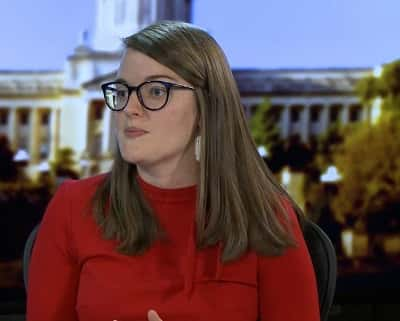
Can you believe that the 2021 Regular Session is less than a hundred days away?
This means that we are stepping up our efforts to get ready for the first day of session on January 5. My colleagues and I are aware of the massive tasks awaiting us when we gavel in for the session. We also understand that it is not politics, but thoughtful, sensible policy that the people of our state want, need and deserve.
Our constituents’ livelihoods are at stake, and that is something that should not be taken lightly. We are working hard here in Frankfort and our home districts to find solutions that will help all Kentuckians who have been affected by the pandemic in all different sectors of life.
Below you will find updates from the Interim Joint Committee meetings that met last week:
Interim Joint Committee on Education: During this month’s meeting, the Kentucky Department of Education shared their COVID-19 transportation guidelines with committee members. KDE worked with the Kentucky Department for Public Health and utilized the Centers for Disease Control and Prevention guidelines when drafting its plan for Kentucky schools.
There are many factors to consider, such as school district size, finances, and social distancing during bus transportation to one child per seat. School districts can utilize the Coronavirus Aid, Relief, and Economic Security (CARES) Act funds to offset any financial burdens. These recommendations could be a challenge, so other strategies can be used if bus capacity cannot be kept low. Other methods could include requiring students to wear masks, check their temperatures before boarding the bus, using hand sanitizer, and assigning seats.
Overall, the guidelines will be left up to each school district as we recognize every school system faces different circumstances.
Interim Joint Committee on Transportation: Committee members discussed REAL ID, permit testing, and Kentucky Motor Vehicle Commission fees.
The Kentucky Transportation Cabinet reported that REAL ID’s would be required by October 2021. Officials expect 30-35 percent of the population to opt-in getting the REAL ID.
Members also heard from Kentucky State Police about driver’s license permit testing. Presenters shared that nearly 33,000 tests had been administered, putting a large dent in the permit-testing backlog due to COVID-19.
Commander Marshall Johnson stated that there are 19,400 permit holders, and about 18,000 have tested. Because a permit can be held for up to three years, not all have moved forward toward a full license status. Before concluding the meeting, the Kentucky Motor Vehicle Commission asked the legislature to support legislation that sustains and stabilizes the department’s operations by increasing license fees. This request would raise the cap to $500 to eliminate the chance of growing costs 30 years from now.
Interim Joint Committee on Appropriations & Revenue: Kentucky Secretary of State Michael Adams estimates that the cost of this year’s General Election will be $5.42 million over budget. According to the Secretary, this figure takes into consideration the $4.5 million in federal relief aid that is left from May’s Primary.
Historically it has cost Kentucky $10 million to run an election. Secretary Adams said the extra expenses associated with the upcoming election range from $4 million to cover postage for absentee ballots to $500,000 in miscellaneous costs, like 1.2 million ink pens for one-time voter use. Adams estimates Kentucky would have 75 to 80 percent of votes counted on election night. He added that results would be turned in faster than during the Primary because of more in-person voting and other processes to speed up the counting of absentee votes.
Committee members also heard testimony about how the state may pay back more than $865 million in loans taken out by the administration to shore up the unemployment insurance fund. Before the pandemic, the unemployment fund was at $600 million and our state had more than 170,000 available jobs. Just this week we learned that our unemployment rate increased 3.1 percent in the past month to 7.6 percent and we see numbers that show more than 200,000 jobs have been lost since July of this year.
Committee members expressed concern about the impact this will have on our state’s economic recovery and agreed that the Governor should be helping employers now with CARES Act funding to help stabilize our economy’s current state.
Interim Joint Committee on Banking and Insurance: Committee members talked about how the Paycheck Protection Program (PPP) has helped prevent a bad situation from becoming far worse. Kentucky banks helped small businesses access the PPP loans. In total, 47,000 PPP loans protected nearly 599,000 Kentucky jobs. This substantially helped struggling businesses who were reeling from the devastating effects of forced closures and shutdowns.
Interim Joint Committee on Agriculture: Legislators spoke out against proposed changes to the permit and fee structure for food processing permits during this week’s meeting. This is a follow up to discussions with the Cabinet for Health and Family Services after they proposed a permit fee increase that would have driven the cost from $125 to more than $2,000 for many food processors.
In addition to our input, at least 400 Kentuckians reached out to the Kentucky Department for Public Health. Most of the submissions expressed concern over the increase in fee amounts. Presenters stated the old fee structure was based on the facility’s square footage, whereas the new fee structure is based on the risk of food production or storage.
The Cabinet made some changes and is now proposing a fee structure based on both the amount of income and the risk associated with the type of food processed.
The committee also heard testimony from the Grain and Forage Center of Excellence, and the University of Kentucky College of Agriculture, Food, and Environment. Both organizations provided information regarding Kentucky’s commercial rye crop initiative. Though rye was once widely grown, production has almost stopped entirely in favor of corn and soybeans’ row-crop output. Farmers who grow cereal rye add additional revenue streams to their operations and promote healthy soil and improved water quality. The goal is to provide enough of this product to supply Kentucky distilleries.
As your voice here in Frankfort, I am always available to discuss our community’s policies or issues. I can be reached through the toll-free message line at 1-800-372-7181, and you can contact me via e-mail at Samara.Heavrin@lrc.ky.gov. You can also follow me on Facebook @KYRepSamaraHeavrin for regular updates. You can also keep track of committee meetings and potential legislation through the Kentucky legislature’s website at www.legislature.ky.gov.
Rep. Samara Heavrin (R)








